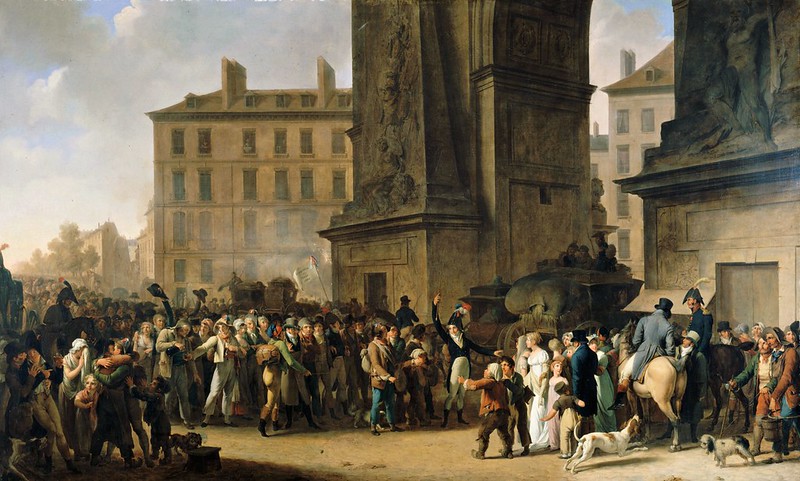François-Adrien Boieldieu (1775-1834)
- Missa Solemnis (in D) à Canto (1823)
Performers: Sonia Warzynska (soprano); Ilona Szczepanska (alt);
Krzysztof Kozarek (tenor); Przemyslaw Balka (bass); Zespól Wokalny
SlNGET; Orkiestra kameralna; Dawid Kusz OP (conductor)
Painting: Louis Léopold Boilly (1761-1845) - Les Conscrits de 1807 Défilant Devant La Porte Saint-Denis (1808)
---
French composer. The son of a clerk in the secretariat of the Rouen
archdiocese, he received his earliest education from the Abbé
Joseph-Jean-Pierre Baillemont. His first music teacher, Urbain
Cordonnier, maître de chapelle at Coutances and Evreux and from 1783 the
children’s choirmaster at Rouen Cathedral, taught him solfège and
singing technique, and before the boy learnt to read music he could sing
by ear in cathedral performances of masses and motets: these included
works by Bernier, Lalande, Campra, Brossard and Jommelli. Boieldieu’s
principal musical training came from Charles Broche (1752-1803), the
cathedral organist at Rouen. Subsequently he went to Italy and spent
several years in Bologna studying with Padre Martini before returning to
Rouen in 1777. Boieldieu made rapid progress as a keyboard player, and
early in 1791 he was appointed organist at the church of St André in
Rouen; about that time his earliest surviving compositions were written.
Soon afterwards he was appearing as a concert pianist, performing his
own sonatas, potpourris and Concerto in F. He made his debut as an opera
composer in 1792 at the Théâtre des Arts with 'La fille coupable'. Its
success allowed him to obtain further commissions and in 1796 to move to
Paris, where two years later he was appointed as professor of piano at
the Conservatoire. In 1800 he had his greatest success with 'Le calife
de Bagdad', but marital difficulties forced him to leave Paris for St.
Petersburg in 1804. After eight years he returned to Paris where he
became court composer and in 1817 was elected to the Académie des beaux
arts. Although the bulk of his operatic composition occurred after 1800
and more properly belongs to the Romantic period, his early successes
show a gifted composer with similar orchestrational technique to André
Ernest Modeste Grétry. He died peacefully on 8 October and was given a
state funeral at the Invalides five days later. His body was taken to
Rouen, and on 13 November he was buried in the Rouen cemetery, where his
fellow citizens paid solemn tribute to his memory.
Boieldieu’s contemporaries (Herold, Auber, Adam, Cherubini and Berlioz
among them) all agreed that Boieldieu was indeed a gifted musician with
exceptional creative ability. His work contains nothing artificial or
affected, and the impetus and unquenchable spirit which he combined with
freshness and grace could not fail to bring the listener under his
spell. The most exceptional feature of his style is its great melodic
wealth and ease. He could compose melody only by singing, and these
melodies therefore sound as if created spontaneously. He built on such
basic materials as the diatonic and chromatic scales, the notes of a
triad or dominant 7th chord, a large leap (10ths occur frequently and,
as shown in ex.1, 12ths and 13ths are not exceptional in his vocal
lines) or a dotted rhythmic pattern. He rarely ornamented the melodic
line with coloratura passages, and these hardly ever exceeded two bars
in length; he seldom wrote virtuoso passages for singers. Boieldieu’s
harmony, in keeping with his general style, never steps outside the
normal confines of its time. Yet although he is best known for deft
management of the simpler progressions, he could write harmony in the
latest Parisian manner when the need arose; the original overture and
several portions of Béniowski (1800) fully portray the emotions
engendered by exile, treachery and exhaustion that this drama contains.
Boieldieu was at all times conscious of the value of orchestral colour;
he used the whole range of instruments and exploited some of their rarer
techniques, e.g. strings col legno in Le calife de Bagdad. Moreover, he
was able to create special sound combinations and poetic effects that
were completely his own. He had a faultless instinct and technique for
his own type of instrumentation, and his scores stand as excellent
examples of clear, rich and lively orchestral writing. To sum up,
Boieldieu’s work is that of an individual, gifted poet and a sensitive,
discriminating artist.

Cap comentari:
Publica un comentari a l'entrada